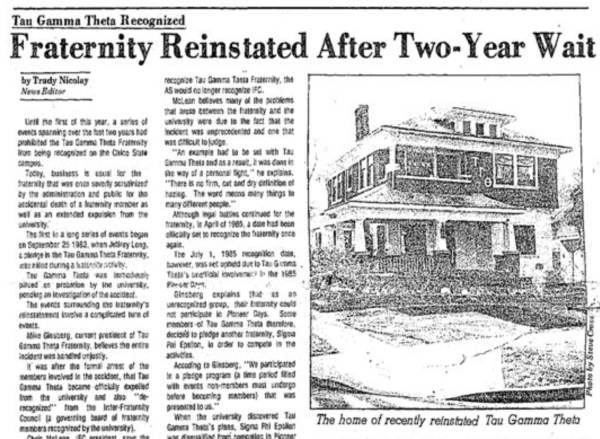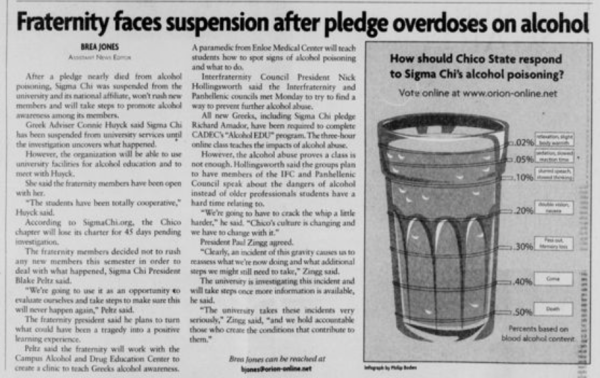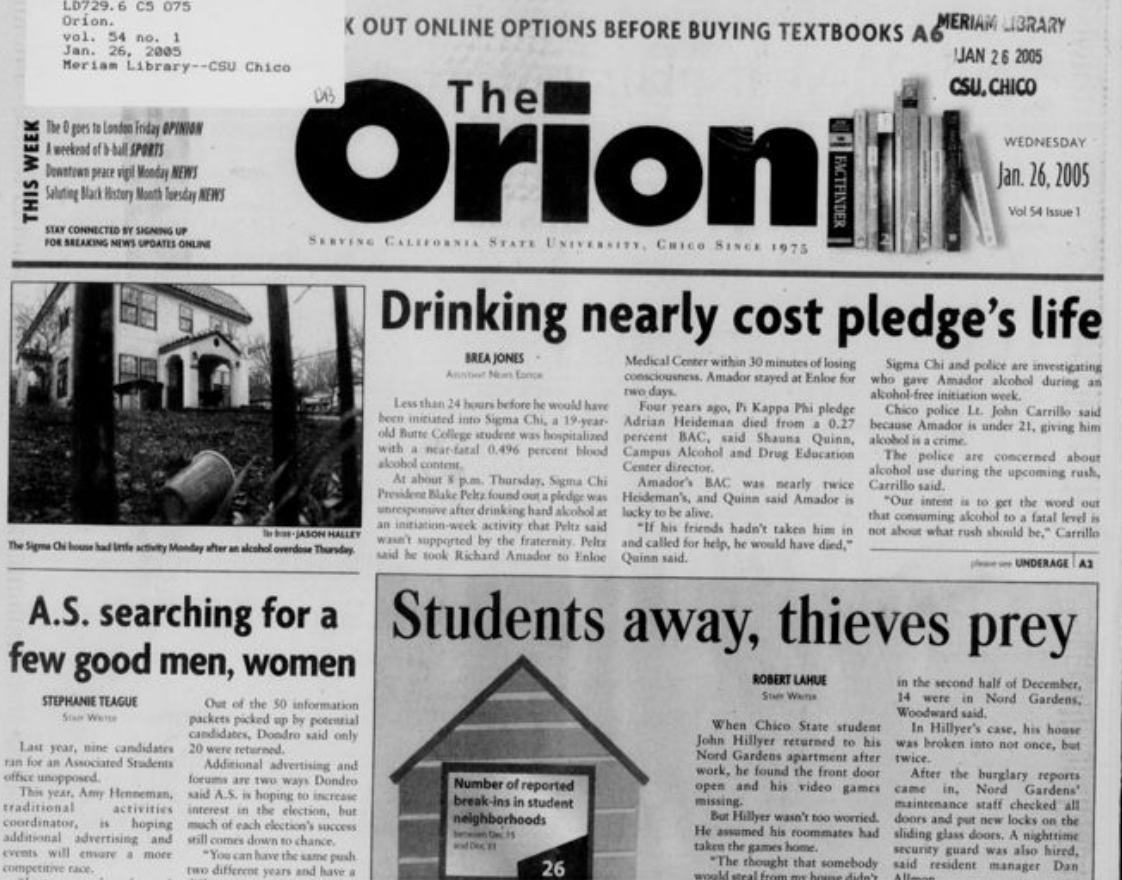For years, Chico State’s Greek life has been hit with hazing investigations, loss of affiliation and temporary suspensions due to violations of Fraternity and Sorority Affairs Policies and Procedures. Here’s what you need to know.
Hazing is defined in California Penal Code 245.6, which was signed into law in 2006, as any method of initiation into an institutionally recognized or unrecognized student organization “which is likely to cause serious bodily injury to any former, current, or prospective student of any school, community college, college, university, or other educational institution in this state.”
If the hazing incident doesn’t result in serious injury, it is a misdemeanor and punishable by a fine ranging from $100 to $5,000 or imprisonment in county jail for under a year, or both.
If it does lead to serious bodily injury or death is guilty of a misdemeanor or felony and can be subject to imprisonment.
Hazing investigations and suspensions, like Lambda Sigma Gamma’s recent four-year suspension and Sigma Pi’s loss of university affiliation, have been frequent for decades.
On Sept. 25, 1983, Tau Gamma Theta pledge Jeffrey Long, 23, was killed when hit by a car during a hazing ritual called “rides,” in which pledges are taken to a remote location and left to find their way home.
In a 1984 issue of The Orion, California Highway Patrol’s report about the incident stated that the pledges, including Long, were taken to the Big Chico Creek Recreation Area, forced to consume large amounts of wine, and then began to walk back to town.
Participating in the ritual were Michael Davirro, 18, and Michael Ginsberg, 23, who obtained their cars through either hitchhiking or calling friends. The two then allegedly engaged in a drag race on River Road in which Davirro’s car struck Long going over 70 mph.
Davirro and Ginsberg were charged with felony manslaughter, and eight other individuals were charged as accessories to a felony.
Hazing activities have also led to alcohol consumption related deaths.
The March 5 1986 issue of The Orion stated that Tau Gamma Theta was expelled from the university and unrecognized by the Interfraternity Council after the accident, but became recognized by the university two years later.

February 2024 marks almost 20 years since the death of Matthew Carrington, which is just one case of a hazing incident that resulted in the death of a fraternity member and a
lawsuit.
Carrington died at 21 in the basement of Chi Tau due to water intoxication after he and several other pledges were instructed to drink water repeatedly while doing pushups and having fans blow cold air on them.

After the incident, several chapter members involved pleaded guilty for their role in Carrington’s death. The university banned all Chico State Greek life chapters from recruiting new pledges for the fall semester as it implemented new rules prohibiting alcohol and hazing from fraternities and sororities.
Carrington’s death led to the establishment of Matt’s Law, California legislation that allows for felony prosecution in hazing cases after the incident has occurred. Carrington’s mother, Debbie Smith, lobbied for the law to be passed in 2006 and was inspired to advocate for change on college campuses.
That same year, Sigma Chi was temporarily suspended after pledge Richard Amador was admitted to the hospital and nearly died from alcohol poisoning.
On Jan. 26, 2005 The Orion confirmed in an article that Amador had a near-fatal blood-alcohol concentration of 0.496. The same article stated that in 2000, Pi Kappa Phi pledge Adrian Heideman died from drinking too much and had a blood-alcohol concentration of 0.27. Sources said that with a BAC of almost double that, Amador was lucky to be alive.

In the 2013-2014 school year, the university faced four alcohol-related deaths, one being Sigma Phi pledge Mason Sumnicht, who died on November 15 after drinking 21 shots on his 21st birthday. Sumnicht was admitted to the hospital on November 4, and was put on life support, but taken off several days before his death.
Former Chico State President Paul Zingg temporarily suspended all Greek life at Chico State, investigations into fraternities Kappa Sigma, Phi Beta Sigma and Sigma Pi followed Sumnicht’s death after accusations of hazing. In March 2014, Greek life was reinstated after a 4-month ban.
After the ban, sororities were temporarily denied permission to conduct sisterhood retreats off campus, and all Greek life chapters agreed to more restrictions and guidelines as recruitment started once again.
However, this wasn’t the first time Zingg cracked down on Greek life activities. In 2006, Zingg outlined 59 recommendations for rules that he believed Greek life organizations should follow. Tau Gamma Theta openly ignored these recommendations and planned to proceed with recruitment in the following Fall as usual.
“We liked Zingg’s rules, they just went against our core values,” former Tau Gamma Theta President Nicholas Angel-Gilliard said.
At the time, sorority Alpha Chi had already been suspended for going against Zingg’s rules and attempting to recruit new members.
Other hazing incidents include a 2006 investigation of fraternity Delta Psi Delta after neighbors reported to the police that someone was being beaten and put into a vehicle with their mouth taped shut during a hazing ritual. Police confirmed upon arrival at the scene that it was hazing, but the investigation was dropped because the pledges were instigating the activity and members were being targeted, whereas hazing has to do with pledges actively pledging the fraternity.

Delta Psi Delta also earned the nickname “Rape Barn” because of rumored incidents involving sexual assault. A 2018 KRCR video revealed a Facebook post complaining about the fraternity’s reputation and warning against attending parties.
The fraternity is not recognized by Chico State, and therefore has not been subject to suspension or punishment by the university because of these allegations.
Despite these incidents, cases show that hazing remains at Chico State. Some point to the fact that even if fraternities are found guilty of hazing or violating Fraternity and Sorority Affairs Policies and Procedures, the organizations have the opportunity to reapply for university recognition after their suspension.
Chico State continues to warn against unrecognized Greek life organizations. Hazing incidents can be reported here.
Grace Stark can be reached at orionmanagingeditor@gmail.com.







